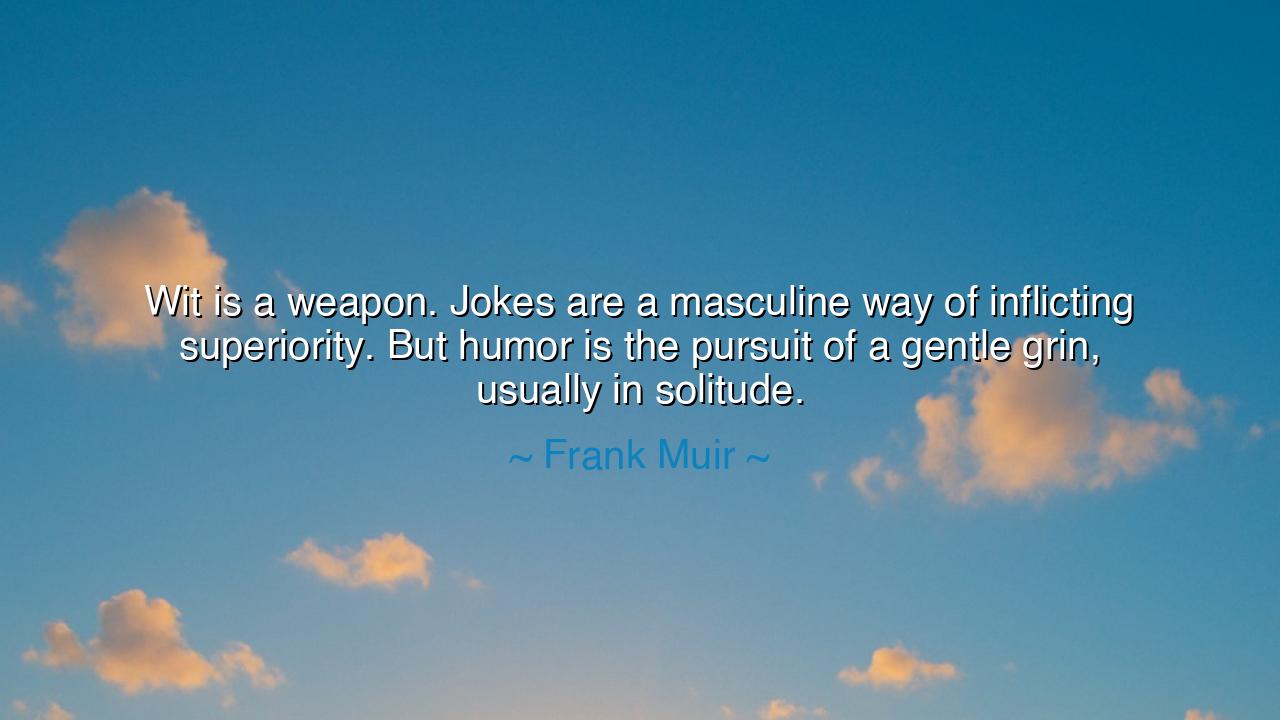
Wit is a weapon. Jokes are a masculine way of inflicting
Wit is a weapon. Jokes are a masculine way of inflicting superiority. But humor is the pursuit of a gentle grin, usually in solitude.






In the words of Frank Muir, the master of language and laughter, there lies a deep and subtle truth: “Wit is a weapon. Jokes are a masculine way of inflicting superiority. But humor is the pursuit of a gentle grin, usually in solitude.” These words are not a mere commentary on comedy, but a reflection upon the nature of the human spirit. They speak to the delicate balance between intellect and compassion, pride and humility, ego and grace. To understand them is to see that wit, jokes, and humor are not the same — they are three roads that lead to very different destinations of the soul.
Wit, Muir tells us, is a weapon. It is the sharp blade of the mind — quick, clever, and often merciless. It dazzles, but it also cuts. The witty man dominates a room with words as a swordsman does with steel. He wins admiration, but seldom love. His triumph is in intellect, not in tenderness. Wit, though glorious, often bears the mark of pride; it thrives on contrast — between the quick and the slow, the clever and the dull. Thus, while it may amuse, it often wounds. Like the sword, it demands skill, but also restraint, for wielded without mercy, it becomes cruelty disguised as brilliance.
Then there are jokes, which Muir calls “a masculine way of inflicting superiority.” Here, humor becomes an act of competition — a means of asserting power through laughter. In many a gathering, men have used jokes as duels — one jest answering another, each laugh a victory. The joke seeks to control the moment, to claim the crowd’s favor, to prove mastery of mind. It is not always unkind, but it is rarely gentle. Its goal is dominance, not harmony. Yet it reveals a deep truth of human nature: that even laughter can be used to climb the ladder of pride. Jokes, then, belong to the world of rivalry and conquest, not to the world of peace.
But humor, as Muir teaches, is another thing entirely. It is not a weapon, nor a contest. It is a gentle pursuit, a quiet smile born not from superiority, but from understanding. True humor comes not from mockery, but from mercy. It sees the absurdity of life — the follies of man, the ironies of fate — and yet it laughs with compassion, not contempt. It is the laughter of one who has suffered and forgiven, who sees both beauty and failure in humanity and embraces them both. It is, as Muir says, “a gentle grin, usually in solitude,” for it does not need applause. It is the smile of the wise, the laughter of the heart that has made peace with imperfection.
Consider Abraham Lincoln, that solemn yet smiling spirit. In the blood-soaked years of civil war, when the fate of his nation trembled in his hands, he was known for his quiet humor. When asked why he told stories amid such suffering, he said, “If I did not laugh, I should die.” His humor was not frivolous, nor cruel; it was his soul’s medicine, his shield against despair. He did not jest to conquer, but to endure. His laughter was not for show, but for solace. In this way, Lincoln embodied what Muir called the pursuit of a gentle grin — the laughter born of wisdom, humility, and the will to continue despite sorrow.
The origin of Muir’s reflection lies in his lifelong love of language — in his understanding that words, like weapons, could heal or harm depending on the hand that wields them. As a writer and humorist, he had seen both the brilliance of wit and the cruelty it could conceal. In his time, cleverness was often prized above kindness, but Muir, with the perspective of age and gentleness, saw through the glitter. He recognized that the truest laughter does not arise from clever victory, but from deep acceptance. His words remind us that laughter, when stripped of pride, becomes an act of grace.
Thus, let this teaching be passed down to all who would speak or jest: use your wit wisely, your jokes sparingly, and your humor abundantly. Let your laughter not wound, but heal. Seek not to shine by belittling others, but to brighten by understanding them. True humor is not the laughter of the crowd, but the smile that lingers when you see the absurdity of life and love it still. It is the echo of compassion, the serenity of wisdom, the quiet joy of being human.
Therefore, live as the ancients taught — with the sword of wit sheathed in kindness, the fire of intellect tempered by mercy, and the laughter of the heart rising from peace. For humor, the purest of all human expressions, is not victory — it is reconciliation. It is the meeting of wisdom and love. And in that meeting, the soul finds its calmest, truest, and most radiant smile.






AAdministratorAdministrator
Welcome, honored guests. Please leave a comment, we will respond soon